International Human Resource Management: Ethics and CSR Challenges
VerifiedAdded on 2022/10/01
|8
|2974
|28
Essay
AI Summary
This essay delves into the multifaceted challenges that International Human Resource Management (IHRM) faces in navigating the crucial domains of ethics and Corporate Social Responsibility (CSR). It emphasizes the significance of ethical conduct and CSR in today's global business environment, highlighting how IHRM professionals act as vital links between companies and their workforce. The essay explores the increasing prominence of CSR and ethical practices, examining how organizations must integrate these elements into their core values. Key challenges discussed include managing diversity, fostering employee engagement in CSR initiatives, promoting ethical leadership, and adapting to cultural differences. The essay also underscores the importance of robust ethical frameworks, data management, and performance management systems. By addressing these issues, the essay provides insights into how IHRM can effectively support ethical business practices and contribute to long-term organizational success. The role of IHRM in fostering ethical leadership and creating a sustainable and responsible business environment is emphasized throughout.
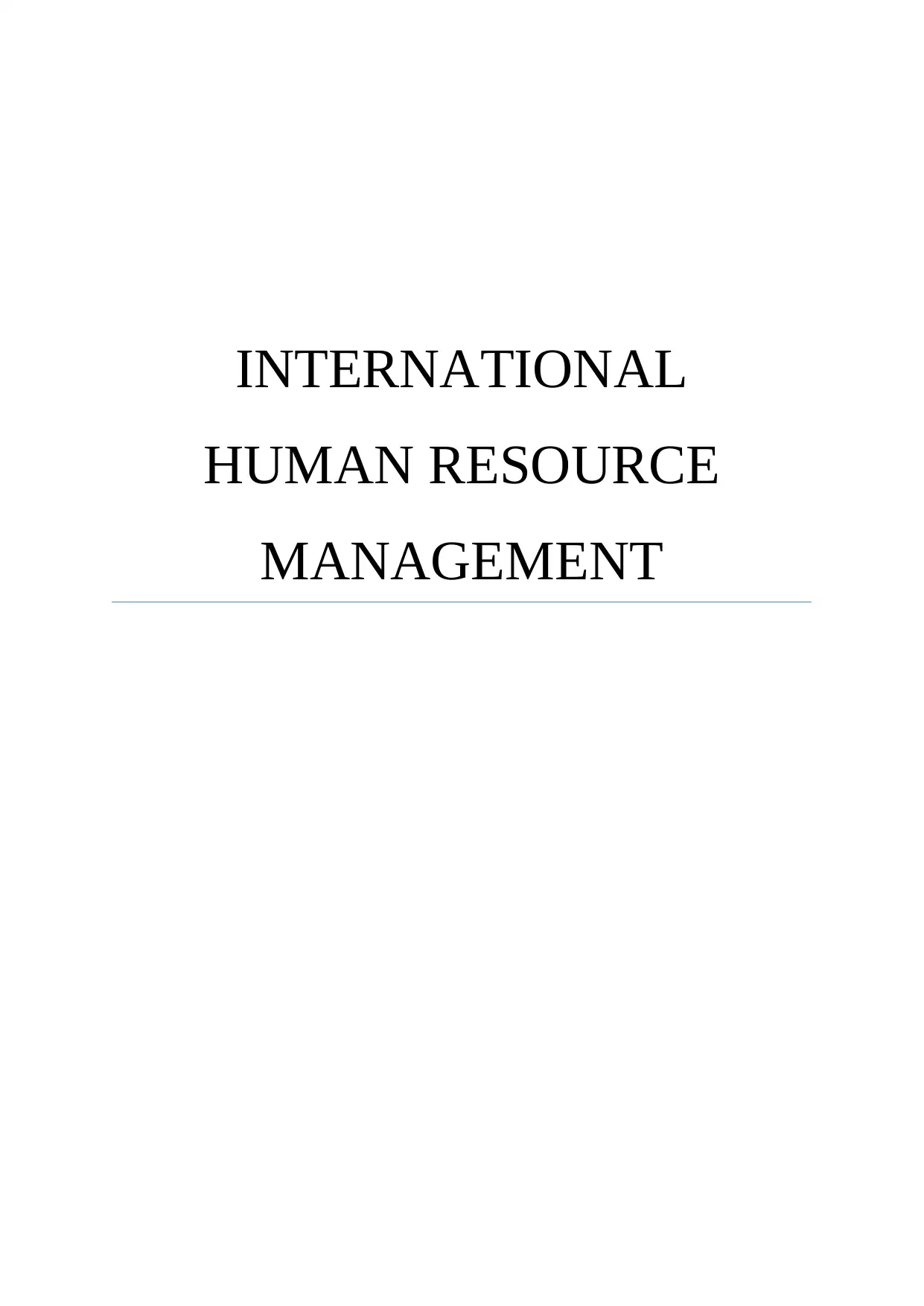
INTERNATIONAL
HUMAN RESOURCE
MANAGEMENT
HUMAN RESOURCE
MANAGEMENT
Paraphrase This Document
Need a fresh take? Get an instant paraphrase of this document with our AI Paraphraser
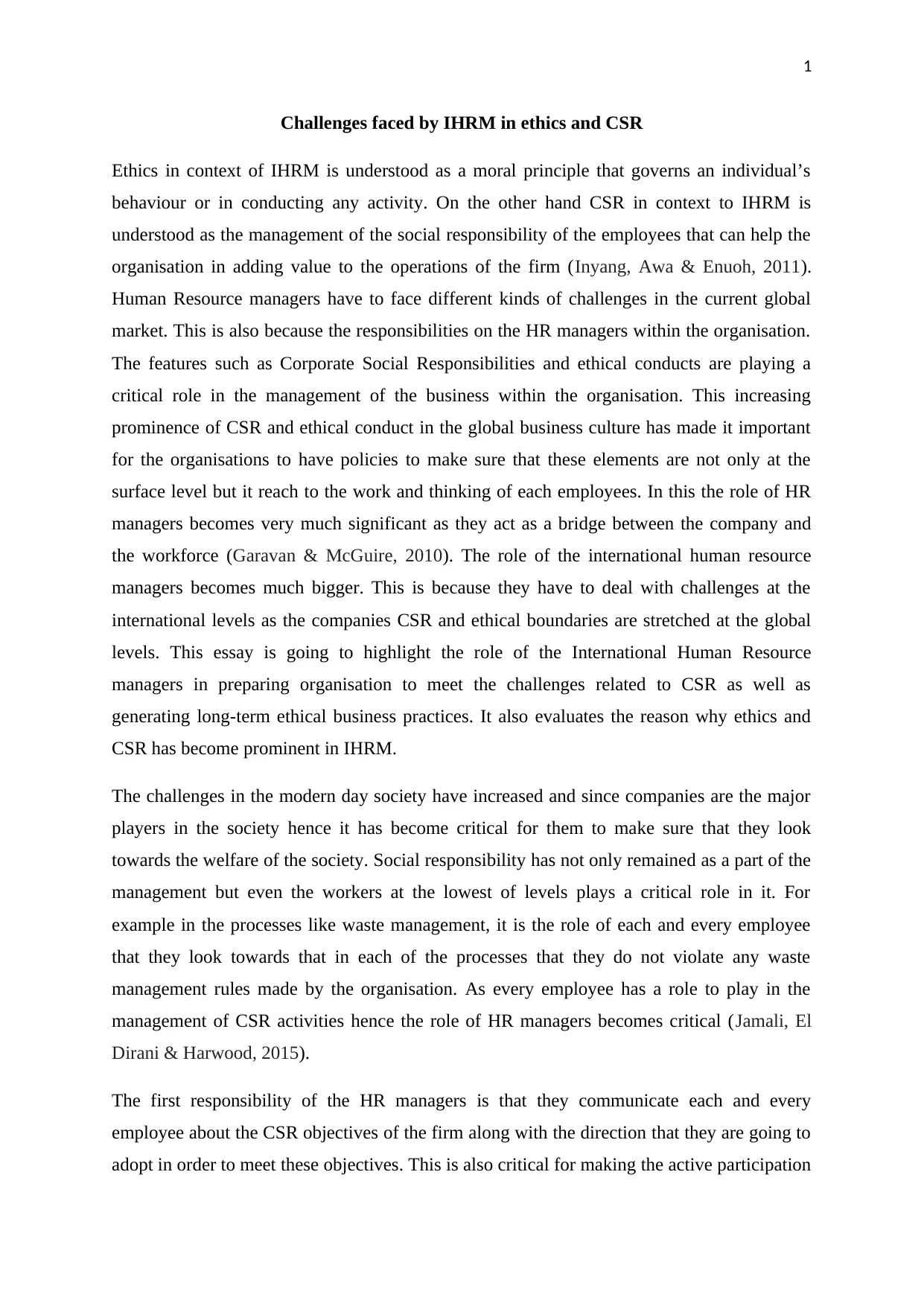
1
Challenges faced by IHRM in ethics and CSR
Ethics in context of IHRM is understood as a moral principle that governs an individual’s
behaviour or in conducting any activity. On the other hand CSR in context to IHRM is
understood as the management of the social responsibility of the employees that can help the
organisation in adding value to the operations of the firm (Inyang, Awa & Enuoh, 2011).
Human Resource managers have to face different kinds of challenges in the current global
market. This is also because the responsibilities on the HR managers within the organisation.
The features such as Corporate Social Responsibilities and ethical conducts are playing a
critical role in the management of the business within the organisation. This increasing
prominence of CSR and ethical conduct in the global business culture has made it important
for the organisations to have policies to make sure that these elements are not only at the
surface level but it reach to the work and thinking of each employees. In this the role of HR
managers becomes very much significant as they act as a bridge between the company and
the workforce (Garavan & McGuire, 2010). The role of the international human resource
managers becomes much bigger. This is because they have to deal with challenges at the
international levels as the companies CSR and ethical boundaries are stretched at the global
levels. This essay is going to highlight the role of the International Human Resource
managers in preparing organisation to meet the challenges related to CSR as well as
generating long-term ethical business practices. It also evaluates the reason why ethics and
CSR has become prominent in IHRM.
The challenges in the modern day society have increased and since companies are the major
players in the society hence it has become critical for them to make sure that they look
towards the welfare of the society. Social responsibility has not only remained as a part of the
management but even the workers at the lowest of levels plays a critical role in it. For
example in the processes like waste management, it is the role of each and every employee
that they look towards that in each of the processes that they do not violate any waste
management rules made by the organisation. As every employee has a role to play in the
management of CSR activities hence the role of HR managers becomes critical (Jamali, El
Dirani & Harwood, 2015).
The first responsibility of the HR managers is that they communicate each and every
employee about the CSR objectives of the firm along with the direction that they are going to
adopt in order to meet these objectives. This is also critical for making the active participation
Challenges faced by IHRM in ethics and CSR
Ethics in context of IHRM is understood as a moral principle that governs an individual’s
behaviour or in conducting any activity. On the other hand CSR in context to IHRM is
understood as the management of the social responsibility of the employees that can help the
organisation in adding value to the operations of the firm (Inyang, Awa & Enuoh, 2011).
Human Resource managers have to face different kinds of challenges in the current global
market. This is also because the responsibilities on the HR managers within the organisation.
The features such as Corporate Social Responsibilities and ethical conducts are playing a
critical role in the management of the business within the organisation. This increasing
prominence of CSR and ethical conduct in the global business culture has made it important
for the organisations to have policies to make sure that these elements are not only at the
surface level but it reach to the work and thinking of each employees. In this the role of HR
managers becomes very much significant as they act as a bridge between the company and
the workforce (Garavan & McGuire, 2010). The role of the international human resource
managers becomes much bigger. This is because they have to deal with challenges at the
international levels as the companies CSR and ethical boundaries are stretched at the global
levels. This essay is going to highlight the role of the International Human Resource
managers in preparing organisation to meet the challenges related to CSR as well as
generating long-term ethical business practices. It also evaluates the reason why ethics and
CSR has become prominent in IHRM.
The challenges in the modern day society have increased and since companies are the major
players in the society hence it has become critical for them to make sure that they look
towards the welfare of the society. Social responsibility has not only remained as a part of the
management but even the workers at the lowest of levels plays a critical role in it. For
example in the processes like waste management, it is the role of each and every employee
that they look towards that in each of the processes that they do not violate any waste
management rules made by the organisation. As every employee has a role to play in the
management of CSR activities hence the role of HR managers becomes critical (Jamali, El
Dirani & Harwood, 2015).
The first responsibility of the HR managers is that they communicate each and every
employee about the CSR objectives of the firm along with the direction that they are going to
adopt in order to meet these objectives. This is also critical for making the active participation
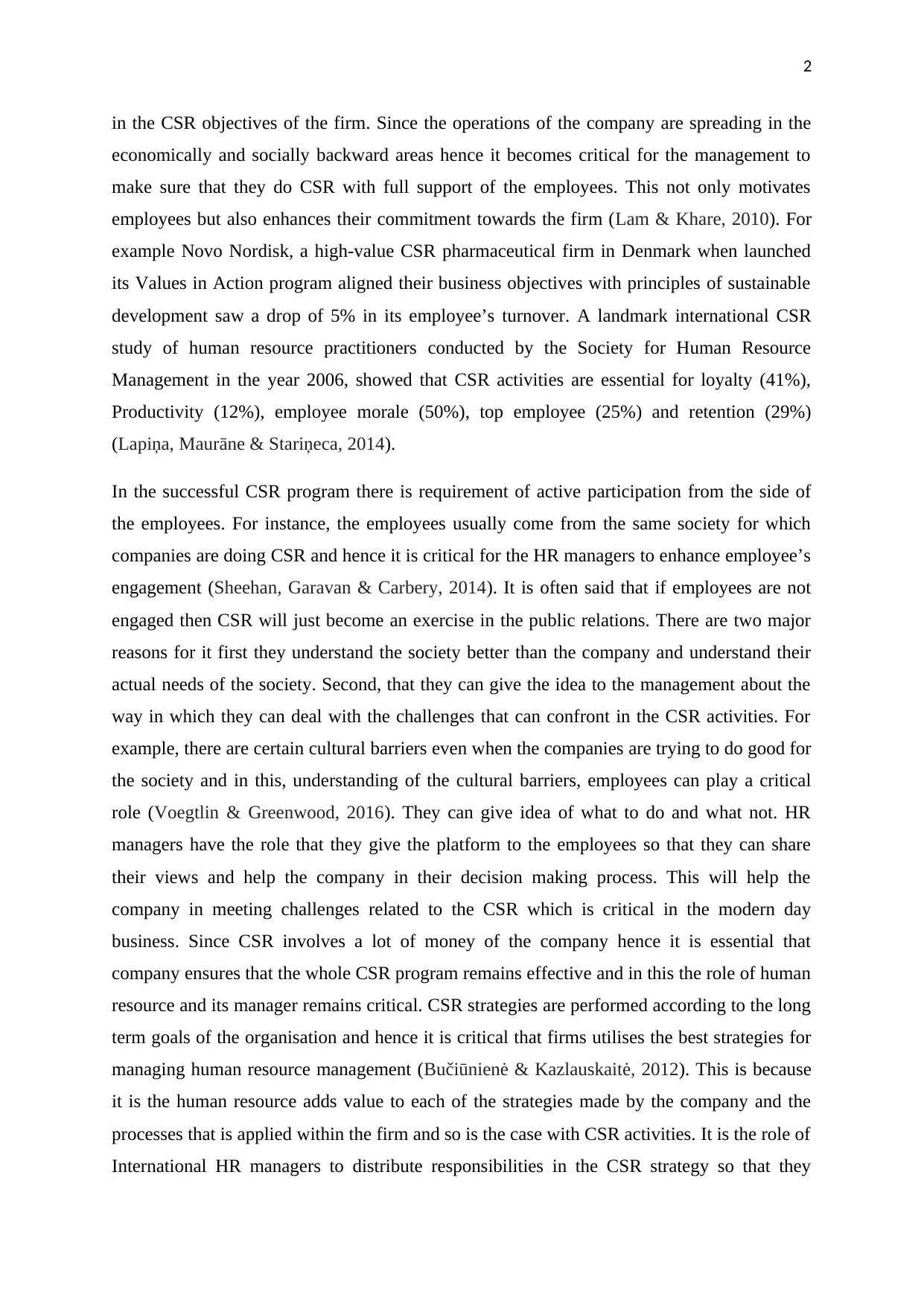
2
in the CSR objectives of the firm. Since the operations of the company are spreading in the
economically and socially backward areas hence it becomes critical for the management to
make sure that they do CSR with full support of the employees. This not only motivates
employees but also enhances their commitment towards the firm (Lam & Khare, 2010). For
example Novo Nordisk, a high-value CSR pharmaceutical firm in Denmark when launched
its Values in Action program aligned their business objectives with principles of sustainable
development saw a drop of 5% in its employee’s turnover. A landmark international CSR
study of human resource practitioners conducted by the Society for Human Resource
Management in the year 2006, showed that CSR activities are essential for loyalty (41%),
Productivity (12%), employee morale (50%), top employee (25%) and retention (29%)
(Lapiņa, Maurāne & Stariņeca, 2014).
In the successful CSR program there is requirement of active participation from the side of
the employees. For instance, the employees usually come from the same society for which
companies are doing CSR and hence it is critical for the HR managers to enhance employee’s
engagement (Sheehan, Garavan & Carbery, 2014). It is often said that if employees are not
engaged then CSR will just become an exercise in the public relations. There are two major
reasons for it first they understand the society better than the company and understand their
actual needs of the society. Second, that they can give the idea to the management about the
way in which they can deal with the challenges that can confront in the CSR activities. For
example, there are certain cultural barriers even when the companies are trying to do good for
the society and in this, understanding of the cultural barriers, employees can play a critical
role (Voegtlin & Greenwood, 2016). They can give idea of what to do and what not. HR
managers have the role that they give the platform to the employees so that they can share
their views and help the company in their decision making process. This will help the
company in meeting challenges related to the CSR which is critical in the modern day
business. Since CSR involves a lot of money of the company hence it is essential that
company ensures that the whole CSR program remains effective and in this the role of human
resource and its manager remains critical. CSR strategies are performed according to the long
term goals of the organisation and hence it is critical that firms utilises the best strategies for
managing human resource management (Bučiūnienė & Kazlauskaitė, 2012). This is because
it is the human resource adds value to each of the strategies made by the company and the
processes that is applied within the firm and so is the case with CSR activities. It is the role of
International HR managers to distribute responsibilities in the CSR strategy so that they
in the CSR objectives of the firm. Since the operations of the company are spreading in the
economically and socially backward areas hence it becomes critical for the management to
make sure that they do CSR with full support of the employees. This not only motivates
employees but also enhances their commitment towards the firm (Lam & Khare, 2010). For
example Novo Nordisk, a high-value CSR pharmaceutical firm in Denmark when launched
its Values in Action program aligned their business objectives with principles of sustainable
development saw a drop of 5% in its employee’s turnover. A landmark international CSR
study of human resource practitioners conducted by the Society for Human Resource
Management in the year 2006, showed that CSR activities are essential for loyalty (41%),
Productivity (12%), employee morale (50%), top employee (25%) and retention (29%)
(Lapiņa, Maurāne & Stariņeca, 2014).
In the successful CSR program there is requirement of active participation from the side of
the employees. For instance, the employees usually come from the same society for which
companies are doing CSR and hence it is critical for the HR managers to enhance employee’s
engagement (Sheehan, Garavan & Carbery, 2014). It is often said that if employees are not
engaged then CSR will just become an exercise in the public relations. There are two major
reasons for it first they understand the society better than the company and understand their
actual needs of the society. Second, that they can give the idea to the management about the
way in which they can deal with the challenges that can confront in the CSR activities. For
example, there are certain cultural barriers even when the companies are trying to do good for
the society and in this, understanding of the cultural barriers, employees can play a critical
role (Voegtlin & Greenwood, 2016). They can give idea of what to do and what not. HR
managers have the role that they give the platform to the employees so that they can share
their views and help the company in their decision making process. This will help the
company in meeting challenges related to the CSR which is critical in the modern day
business. Since CSR involves a lot of money of the company hence it is essential that
company ensures that the whole CSR program remains effective and in this the role of human
resource and its manager remains critical. CSR strategies are performed according to the long
term goals of the organisation and hence it is critical that firms utilises the best strategies for
managing human resource management (Bučiūnienė & Kazlauskaitė, 2012). This is because
it is the human resource adds value to each of the strategies made by the company and the
processes that is applied within the firm and so is the case with CSR activities. It is the role of
International HR managers to distribute responsibilities in the CSR strategy so that they
⊘ This is a preview!⊘
Do you want full access?
Subscribe today to unlock all pages.

Trusted by 1+ million students worldwide
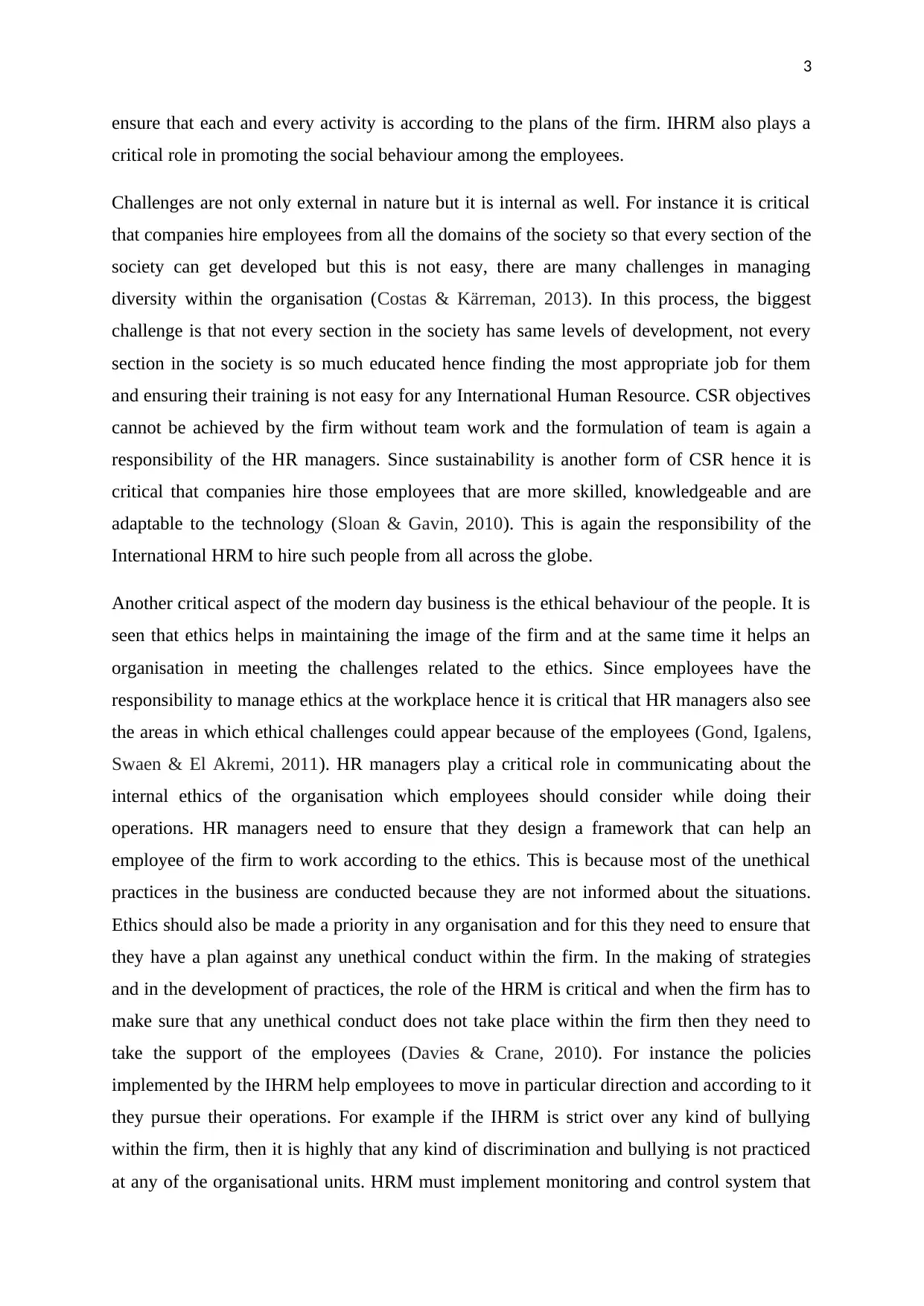
3
ensure that each and every activity is according to the plans of the firm. IHRM also plays a
critical role in promoting the social behaviour among the employees.
Challenges are not only external in nature but it is internal as well. For instance it is critical
that companies hire employees from all the domains of the society so that every section of the
society can get developed but this is not easy, there are many challenges in managing
diversity within the organisation (Costas & Kärreman, 2013). In this process, the biggest
challenge is that not every section in the society has same levels of development, not every
section in the society is so much educated hence finding the most appropriate job for them
and ensuring their training is not easy for any International Human Resource. CSR objectives
cannot be achieved by the firm without team work and the formulation of team is again a
responsibility of the HR managers. Since sustainability is another form of CSR hence it is
critical that companies hire those employees that are more skilled, knowledgeable and are
adaptable to the technology (Sloan & Gavin, 2010). This is again the responsibility of the
International HRM to hire such people from all across the globe.
Another critical aspect of the modern day business is the ethical behaviour of the people. It is
seen that ethics helps in maintaining the image of the firm and at the same time it helps an
organisation in meeting the challenges related to the ethics. Since employees have the
responsibility to manage ethics at the workplace hence it is critical that HR managers also see
the areas in which ethical challenges could appear because of the employees (Gond, Igalens,
Swaen & El Akremi, 2011). HR managers play a critical role in communicating about the
internal ethics of the organisation which employees should consider while doing their
operations. HR managers need to ensure that they design a framework that can help an
employee of the firm to work according to the ethics. This is because most of the unethical
practices in the business are conducted because they are not informed about the situations.
Ethics should also be made a priority in any organisation and for this they need to ensure that
they have a plan against any unethical conduct within the firm. In the making of strategies
and in the development of practices, the role of the HRM is critical and when the firm has to
make sure that any unethical conduct does not take place within the firm then they need to
take the support of the employees (Davies & Crane, 2010). For instance the policies
implemented by the IHRM help employees to move in particular direction and according to it
they pursue their operations. For example if the IHRM is strict over any kind of bullying
within the firm, then it is highly that any kind of discrimination and bullying is not practiced
at any of the organisational units. HRM must implement monitoring and control system that
ensure that each and every activity is according to the plans of the firm. IHRM also plays a
critical role in promoting the social behaviour among the employees.
Challenges are not only external in nature but it is internal as well. For instance it is critical
that companies hire employees from all the domains of the society so that every section of the
society can get developed but this is not easy, there are many challenges in managing
diversity within the organisation (Costas & Kärreman, 2013). In this process, the biggest
challenge is that not every section in the society has same levels of development, not every
section in the society is so much educated hence finding the most appropriate job for them
and ensuring their training is not easy for any International Human Resource. CSR objectives
cannot be achieved by the firm without team work and the formulation of team is again a
responsibility of the HR managers. Since sustainability is another form of CSR hence it is
critical that companies hire those employees that are more skilled, knowledgeable and are
adaptable to the technology (Sloan & Gavin, 2010). This is again the responsibility of the
International HRM to hire such people from all across the globe.
Another critical aspect of the modern day business is the ethical behaviour of the people. It is
seen that ethics helps in maintaining the image of the firm and at the same time it helps an
organisation in meeting the challenges related to the ethics. Since employees have the
responsibility to manage ethics at the workplace hence it is critical that HR managers also see
the areas in which ethical challenges could appear because of the employees (Gond, Igalens,
Swaen & El Akremi, 2011). HR managers play a critical role in communicating about the
internal ethics of the organisation which employees should consider while doing their
operations. HR managers need to ensure that they design a framework that can help an
employee of the firm to work according to the ethics. This is because most of the unethical
practices in the business are conducted because they are not informed about the situations.
Ethics should also be made a priority in any organisation and for this they need to ensure that
they have a plan against any unethical conduct within the firm. In the making of strategies
and in the development of practices, the role of the HRM is critical and when the firm has to
make sure that any unethical conduct does not take place within the firm then they need to
take the support of the employees (Davies & Crane, 2010). For instance the policies
implemented by the IHRM help employees to move in particular direction and according to it
they pursue their operations. For example if the IHRM is strict over any kind of bullying
within the firm, then it is highly that any kind of discrimination and bullying is not practiced
at any of the organisational units. HRM must implement monitoring and control system that
Paraphrase This Document
Need a fresh take? Get an instant paraphrase of this document with our AI Paraphraser
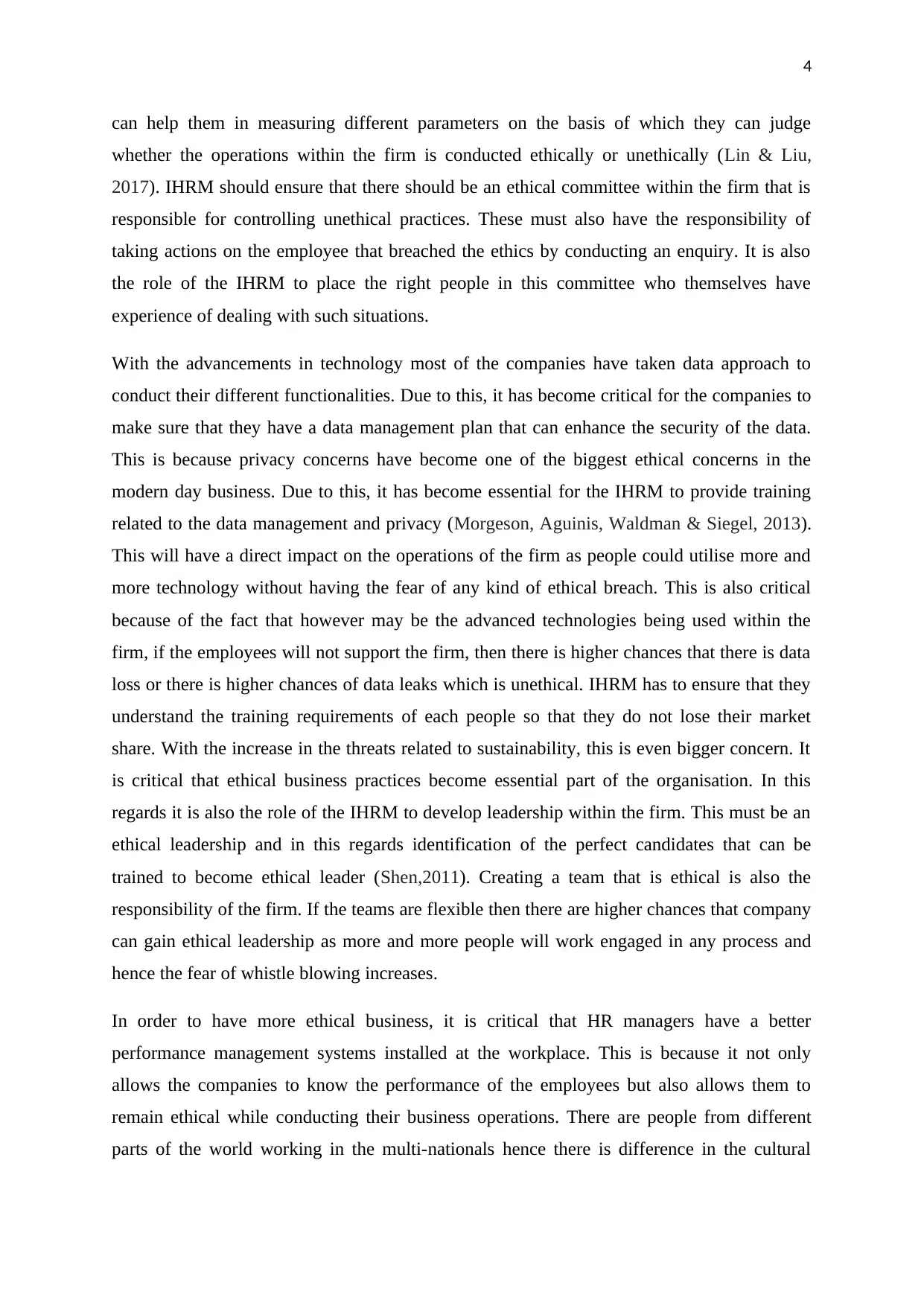
4
can help them in measuring different parameters on the basis of which they can judge
whether the operations within the firm is conducted ethically or unethically (Lin & Liu,
2017). IHRM should ensure that there should be an ethical committee within the firm that is
responsible for controlling unethical practices. These must also have the responsibility of
taking actions on the employee that breached the ethics by conducting an enquiry. It is also
the role of the IHRM to place the right people in this committee who themselves have
experience of dealing with such situations.
With the advancements in technology most of the companies have taken data approach to
conduct their different functionalities. Due to this, it has become critical for the companies to
make sure that they have a data management plan that can enhance the security of the data.
This is because privacy concerns have become one of the biggest ethical concerns in the
modern day business. Due to this, it has become essential for the IHRM to provide training
related to the data management and privacy (Morgeson, Aguinis, Waldman & Siegel, 2013).
This will have a direct impact on the operations of the firm as people could utilise more and
more technology without having the fear of any kind of ethical breach. This is also critical
because of the fact that however may be the advanced technologies being used within the
firm, if the employees will not support the firm, then there is higher chances that there is data
loss or there is higher chances of data leaks which is unethical. IHRM has to ensure that they
understand the training requirements of each people so that they do not lose their market
share. With the increase in the threats related to sustainability, this is even bigger concern. It
is critical that ethical business practices become essential part of the organisation. In this
regards it is also the role of the IHRM to develop leadership within the firm. This must be an
ethical leadership and in this regards identification of the perfect candidates that can be
trained to become ethical leader (Shen,2011). Creating a team that is ethical is also the
responsibility of the firm. If the teams are flexible then there are higher chances that company
can gain ethical leadership as more and more people will work engaged in any process and
hence the fear of whistle blowing increases.
In order to have more ethical business, it is critical that HR managers have a better
performance management systems installed at the workplace. This is because it not only
allows the companies to know the performance of the employees but also allows them to
remain ethical while conducting their business operations. There are people from different
parts of the world working in the multi-nationals hence there is difference in the cultural
can help them in measuring different parameters on the basis of which they can judge
whether the operations within the firm is conducted ethically or unethically (Lin & Liu,
2017). IHRM should ensure that there should be an ethical committee within the firm that is
responsible for controlling unethical practices. These must also have the responsibility of
taking actions on the employee that breached the ethics by conducting an enquiry. It is also
the role of the IHRM to place the right people in this committee who themselves have
experience of dealing with such situations.
With the advancements in technology most of the companies have taken data approach to
conduct their different functionalities. Due to this, it has become critical for the companies to
make sure that they have a data management plan that can enhance the security of the data.
This is because privacy concerns have become one of the biggest ethical concerns in the
modern day business. Due to this, it has become essential for the IHRM to provide training
related to the data management and privacy (Morgeson, Aguinis, Waldman & Siegel, 2013).
This will have a direct impact on the operations of the firm as people could utilise more and
more technology without having the fear of any kind of ethical breach. This is also critical
because of the fact that however may be the advanced technologies being used within the
firm, if the employees will not support the firm, then there is higher chances that there is data
loss or there is higher chances of data leaks which is unethical. IHRM has to ensure that they
understand the training requirements of each people so that they do not lose their market
share. With the increase in the threats related to sustainability, this is even bigger concern. It
is critical that ethical business practices become essential part of the organisation. In this
regards it is also the role of the IHRM to develop leadership within the firm. This must be an
ethical leadership and in this regards identification of the perfect candidates that can be
trained to become ethical leader (Shen,2011). Creating a team that is ethical is also the
responsibility of the firm. If the teams are flexible then there are higher chances that company
can gain ethical leadership as more and more people will work engaged in any process and
hence the fear of whistle blowing increases.
In order to have more ethical business, it is critical that HR managers have a better
performance management systems installed at the workplace. This is because it not only
allows the companies to know the performance of the employees but also allows them to
remain ethical while conducting their business operations. There are people from different
parts of the world working in the multi-nationals hence there is difference in the cultural
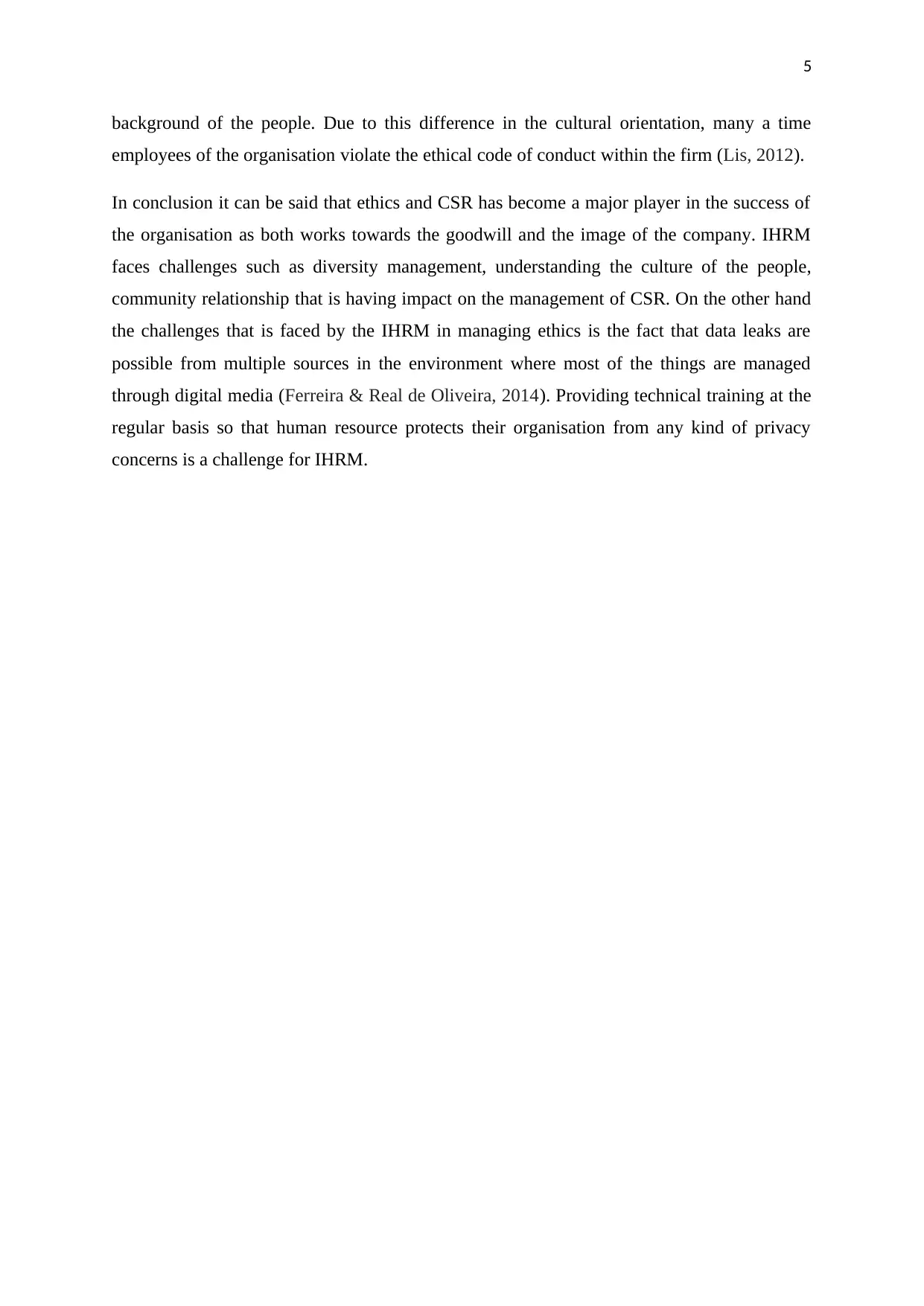
5
background of the people. Due to this difference in the cultural orientation, many a time
employees of the organisation violate the ethical code of conduct within the firm (Lis, 2012).
In conclusion it can be said that ethics and CSR has become a major player in the success of
the organisation as both works towards the goodwill and the image of the company. IHRM
faces challenges such as diversity management, understanding the culture of the people,
community relationship that is having impact on the management of CSR. On the other hand
the challenges that is faced by the IHRM in managing ethics is the fact that data leaks are
possible from multiple sources in the environment where most of the things are managed
through digital media (Ferreira & Real de Oliveira, 2014). Providing technical training at the
regular basis so that human resource protects their organisation from any kind of privacy
concerns is a challenge for IHRM.
background of the people. Due to this difference in the cultural orientation, many a time
employees of the organisation violate the ethical code of conduct within the firm (Lis, 2012).
In conclusion it can be said that ethics and CSR has become a major player in the success of
the organisation as both works towards the goodwill and the image of the company. IHRM
faces challenges such as diversity management, understanding the culture of the people,
community relationship that is having impact on the management of CSR. On the other hand
the challenges that is faced by the IHRM in managing ethics is the fact that data leaks are
possible from multiple sources in the environment where most of the things are managed
through digital media (Ferreira & Real de Oliveira, 2014). Providing technical training at the
regular basis so that human resource protects their organisation from any kind of privacy
concerns is a challenge for IHRM.
⊘ This is a preview!⊘
Do you want full access?
Subscribe today to unlock all pages.

Trusted by 1+ million students worldwide
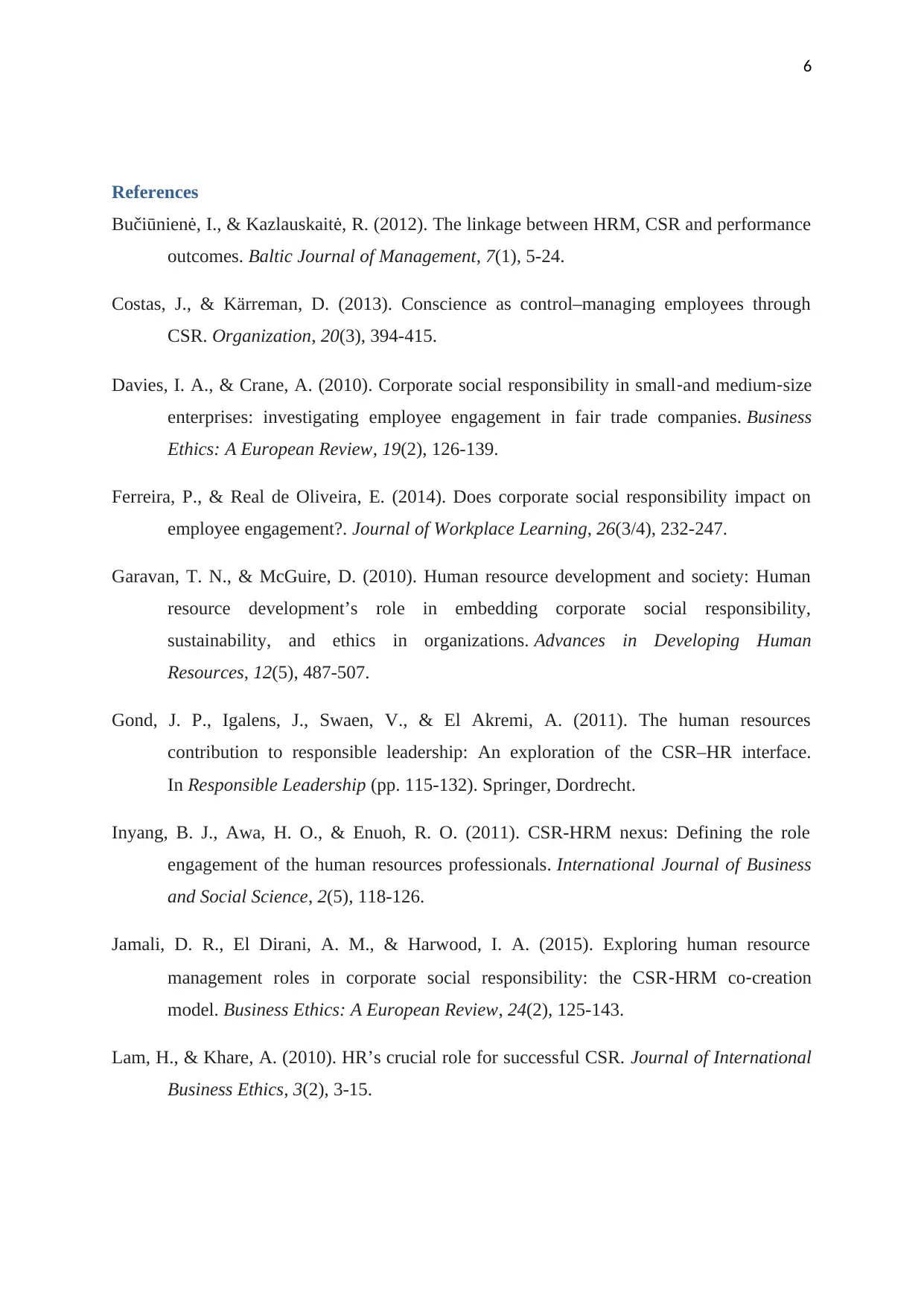
6
References
Bučiūnienė, I., & Kazlauskaitė, R. (2012). The linkage between HRM, CSR and performance
outcomes. Baltic Journal of Management, 7(1), 5-24.
Costas, J., & Kärreman, D. (2013). Conscience as control–managing employees through
CSR. Organization, 20(3), 394-415.
Davies, I. A., & Crane, A. (2010). Corporate social responsibility in small‐and medium‐size
enterprises: investigating employee engagement in fair trade companies. Business
Ethics: A European Review, 19(2), 126-139.
Ferreira, P., & Real de Oliveira, E. (2014). Does corporate social responsibility impact on
employee engagement?. Journal of Workplace Learning, 26(3/4), 232-247.
Garavan, T. N., & McGuire, D. (2010). Human resource development and society: Human
resource development’s role in embedding corporate social responsibility,
sustainability, and ethics in organizations. Advances in Developing Human
Resources, 12(5), 487-507.
Gond, J. P., Igalens, J., Swaen, V., & El Akremi, A. (2011). The human resources
contribution to responsible leadership: An exploration of the CSR–HR interface.
In Responsible Leadership (pp. 115-132). Springer, Dordrecht.
Inyang, B. J., Awa, H. O., & Enuoh, R. O. (2011). CSR-HRM nexus: Defining the role
engagement of the human resources professionals. International Journal of Business
and Social Science, 2(5), 118-126.
Jamali, D. R., El Dirani, A. M., & Harwood, I. A. (2015). Exploring human resource
management roles in corporate social responsibility: the CSR‐HRM co‐creation
model. Business Ethics: A European Review, 24(2), 125-143.
Lam, H., & Khare, A. (2010). HR’s crucial role for successful CSR. Journal of International
Business Ethics, 3(2), 3-15.
References
Bučiūnienė, I., & Kazlauskaitė, R. (2012). The linkage between HRM, CSR and performance
outcomes. Baltic Journal of Management, 7(1), 5-24.
Costas, J., & Kärreman, D. (2013). Conscience as control–managing employees through
CSR. Organization, 20(3), 394-415.
Davies, I. A., & Crane, A. (2010). Corporate social responsibility in small‐and medium‐size
enterprises: investigating employee engagement in fair trade companies. Business
Ethics: A European Review, 19(2), 126-139.
Ferreira, P., & Real de Oliveira, E. (2014). Does corporate social responsibility impact on
employee engagement?. Journal of Workplace Learning, 26(3/4), 232-247.
Garavan, T. N., & McGuire, D. (2010). Human resource development and society: Human
resource development’s role in embedding corporate social responsibility,
sustainability, and ethics in organizations. Advances in Developing Human
Resources, 12(5), 487-507.
Gond, J. P., Igalens, J., Swaen, V., & El Akremi, A. (2011). The human resources
contribution to responsible leadership: An exploration of the CSR–HR interface.
In Responsible Leadership (pp. 115-132). Springer, Dordrecht.
Inyang, B. J., Awa, H. O., & Enuoh, R. O. (2011). CSR-HRM nexus: Defining the role
engagement of the human resources professionals. International Journal of Business
and Social Science, 2(5), 118-126.
Jamali, D. R., El Dirani, A. M., & Harwood, I. A. (2015). Exploring human resource
management roles in corporate social responsibility: the CSR‐HRM co‐creation
model. Business Ethics: A European Review, 24(2), 125-143.
Lam, H., & Khare, A. (2010). HR’s crucial role for successful CSR. Journal of International
Business Ethics, 3(2), 3-15.
Paraphrase This Document
Need a fresh take? Get an instant paraphrase of this document with our AI Paraphraser
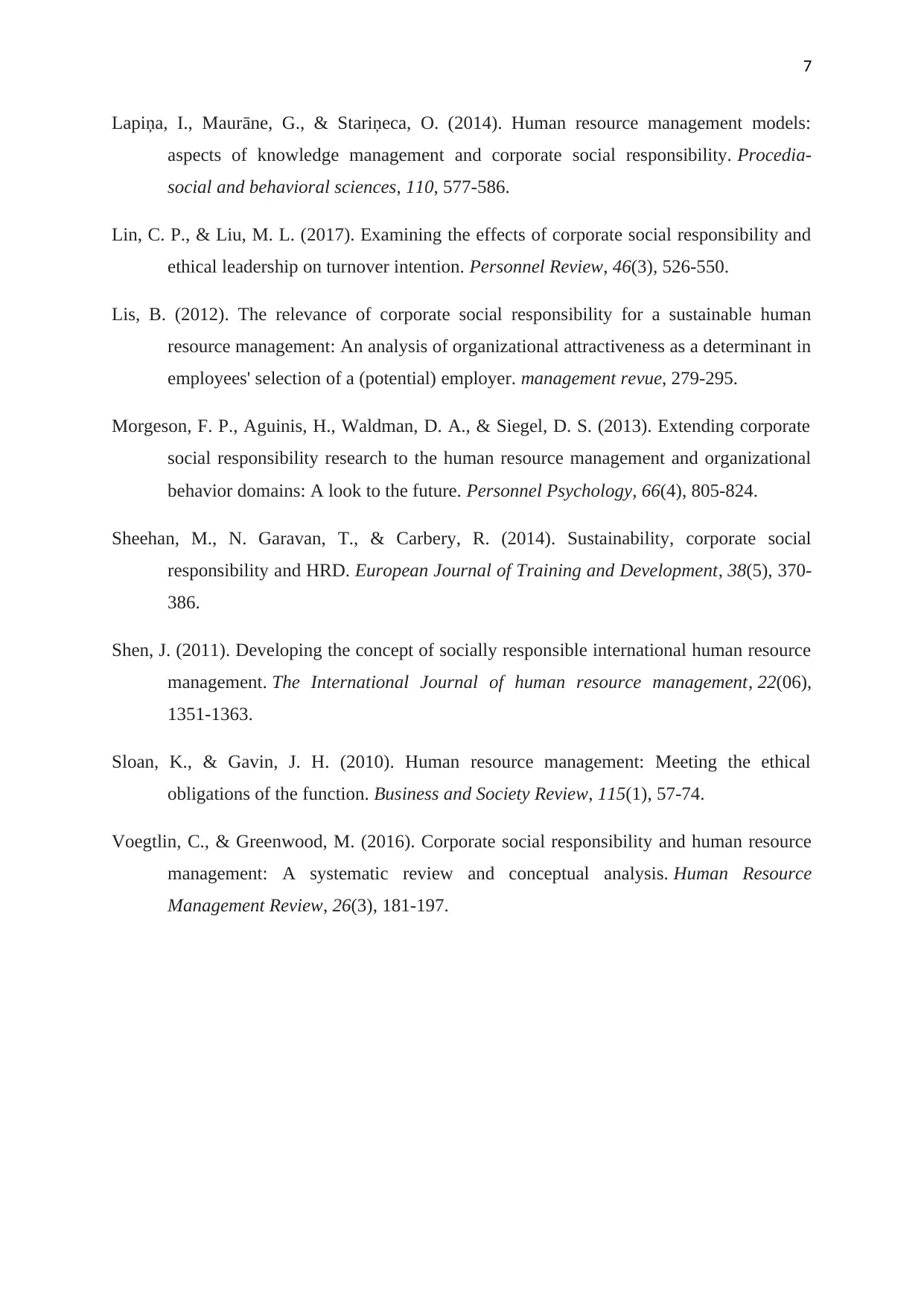
7
Lapiņa, I., Maurāne, G., & Stariņeca, O. (2014). Human resource management models:
aspects of knowledge management and corporate social responsibility. Procedia-
social and behavioral sciences, 110, 577-586.
Lin, C. P., & Liu, M. L. (2017). Examining the effects of corporate social responsibility and
ethical leadership on turnover intention. Personnel Review, 46(3), 526-550.
Lis, B. (2012). The relevance of corporate social responsibility for a sustainable human
resource management: An analysis of organizational attractiveness as a determinant in
employees' selection of a (potential) employer. management revue, 279-295.
Morgeson, F. P., Aguinis, H., Waldman, D. A., & Siegel, D. S. (2013). Extending corporate
social responsibility research to the human resource management and organizational
behavior domains: A look to the future. Personnel Psychology, 66(4), 805-824.
Sheehan, M., N. Garavan, T., & Carbery, R. (2014). Sustainability, corporate social
responsibility and HRD. European Journal of Training and Development, 38(5), 370-
386.
Shen, J. (2011). Developing the concept of socially responsible international human resource
management. The International Journal of human resource management, 22(06),
1351-1363.
Sloan, K., & Gavin, J. H. (2010). Human resource management: Meeting the ethical
obligations of the function. Business and Society Review, 115(1), 57-74.
Voegtlin, C., & Greenwood, M. (2016). Corporate social responsibility and human resource
management: A systematic review and conceptual analysis. Human Resource
Management Review, 26(3), 181-197.
Lapiņa, I., Maurāne, G., & Stariņeca, O. (2014). Human resource management models:
aspects of knowledge management and corporate social responsibility. Procedia-
social and behavioral sciences, 110, 577-586.
Lin, C. P., & Liu, M. L. (2017). Examining the effects of corporate social responsibility and
ethical leadership on turnover intention. Personnel Review, 46(3), 526-550.
Lis, B. (2012). The relevance of corporate social responsibility for a sustainable human
resource management: An analysis of organizational attractiveness as a determinant in
employees' selection of a (potential) employer. management revue, 279-295.
Morgeson, F. P., Aguinis, H., Waldman, D. A., & Siegel, D. S. (2013). Extending corporate
social responsibility research to the human resource management and organizational
behavior domains: A look to the future. Personnel Psychology, 66(4), 805-824.
Sheehan, M., N. Garavan, T., & Carbery, R. (2014). Sustainability, corporate social
responsibility and HRD. European Journal of Training and Development, 38(5), 370-
386.
Shen, J. (2011). Developing the concept of socially responsible international human resource
management. The International Journal of human resource management, 22(06),
1351-1363.
Sloan, K., & Gavin, J. H. (2010). Human resource management: Meeting the ethical
obligations of the function. Business and Society Review, 115(1), 57-74.
Voegtlin, C., & Greenwood, M. (2016). Corporate social responsibility and human resource
management: A systematic review and conceptual analysis. Human Resource
Management Review, 26(3), 181-197.
1 out of 8
Related Documents
Your All-in-One AI-Powered Toolkit for Academic Success.
+13062052269
info@desklib.com
Available 24*7 on WhatsApp / Email
![[object Object]](/_next/static/media/star-bottom.7253800d.svg)
Unlock your academic potential
Copyright © 2020–2025 A2Z Services. All Rights Reserved. Developed and managed by ZUCOL.




